Moot Court Programme
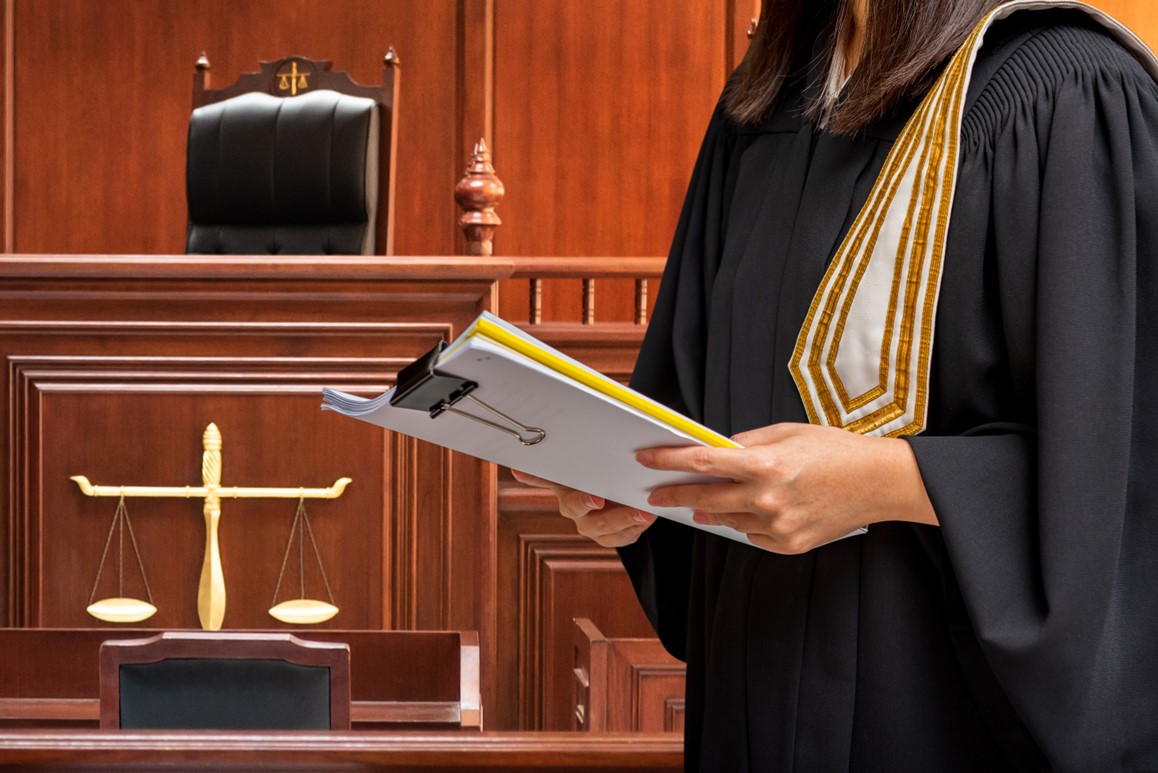
A cross-cutting programme of experiential legal education
As part of the Masters in Law programmes, the Faculty of Law, Economics and Finance invites all Master students to participate in a moot court competition during their studies. Moot courts are an excellent way to apply the knowledge acquired in the classroom and practice the necessary skills to become a great lawyer. By taking a fictitious case, analysing the pertaining issues and defending a fictitious party before international experts, our students gain experience that will serve them throughout their career.
Participants take part in simulated court proceedings, draft briefs (or memorials) and participate in oral pleadings. Students receive training during the academic year which allows them not only to deepen their knowledge in the respective field of law but also to develop transferable and social skills, such as working in a team and improving both their writing and oral advocacy skills. The Faculty of Law, Economics and Finance puts a strong emphasis on the moot court experience and in the past years the Uni.lu teams have achieved remarkable results in moot court competitions at European and international level.
Students enrolled in the Uni.lu Moot Court Programme may be awarded 5 ECTS per semester and a course waiver for their participation, depending on the Master in Law programme concerned. The Uni.lu mooters receive a dedicated certificate of appreciation in addition to the various moot-specific awards. Networking, meeting and sharing with students from universities worldwide are also part of this rewarding experience.
Teams are coached by doctoral and post-doctoral researchers. Each team is also assigned a supervising professor. The Uni.lu Moot Court Programme is led by Dr. Susana Muñoz. During the past 10 years (2015–2025), our moot court activities have been carried out with the support of Clifford Chance Luxembourg.
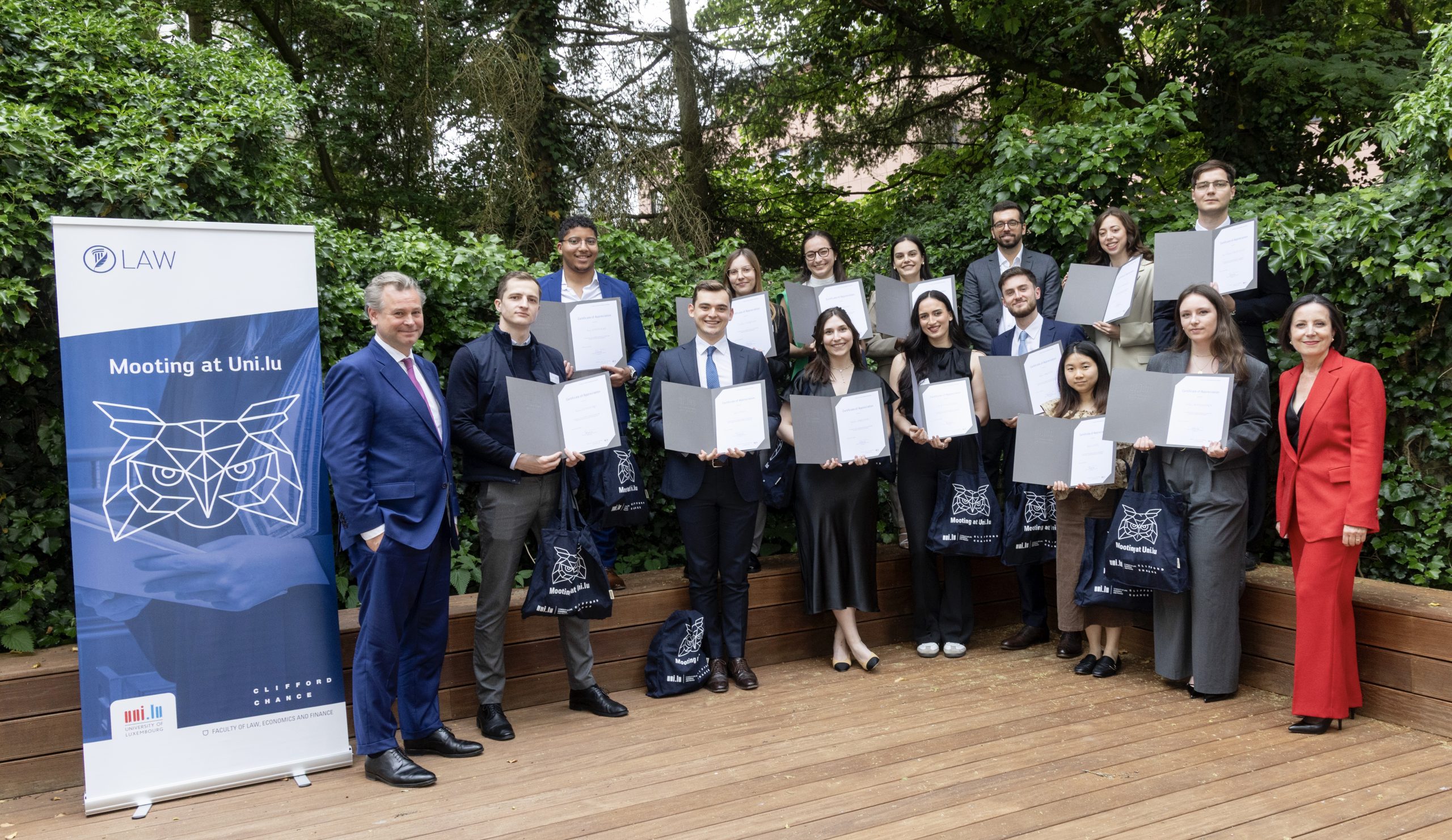
Moot Court Competitions
Over the years, the Faculty of Law, Economics and Finance has participated in the following moot court competitions:
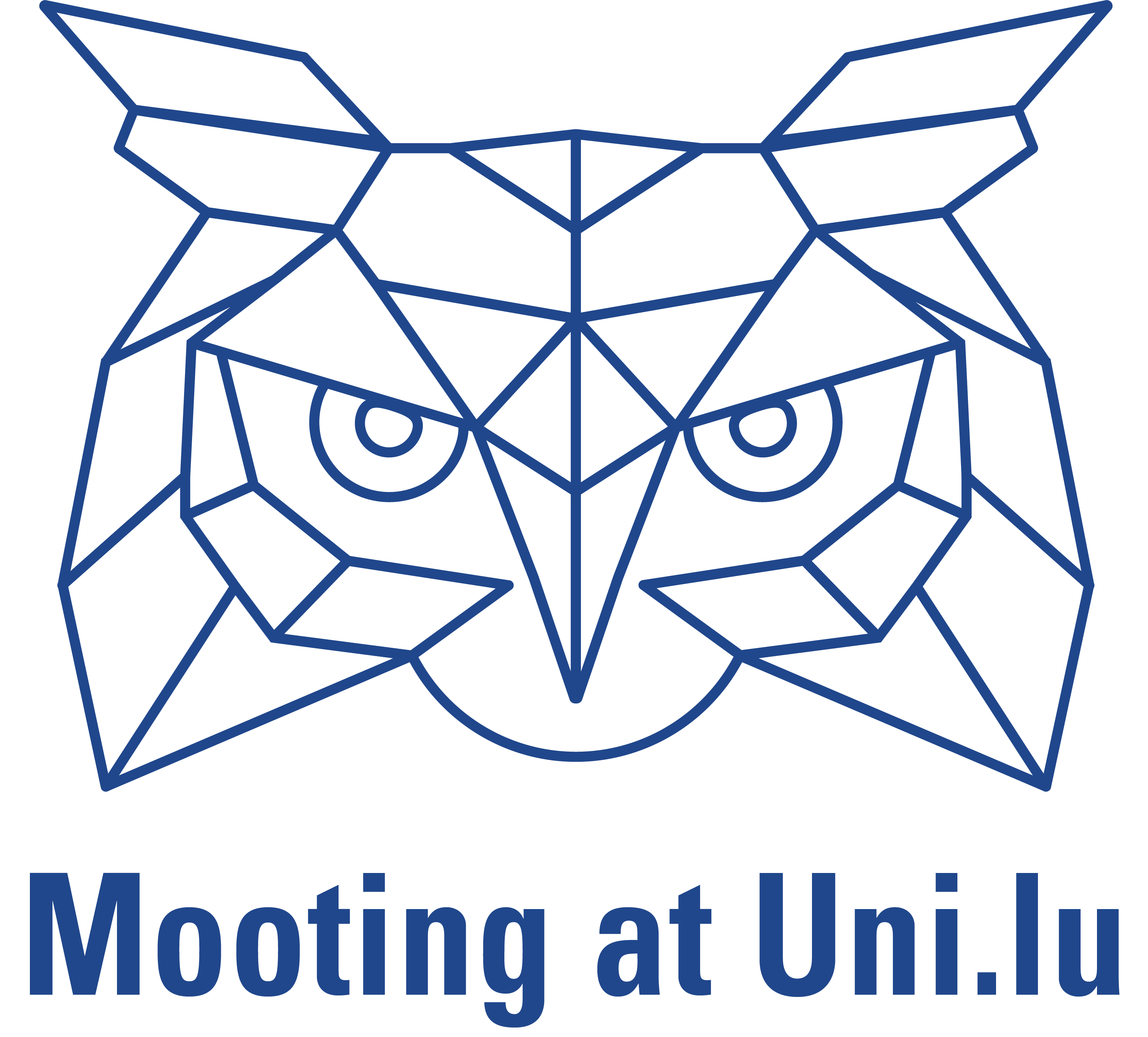
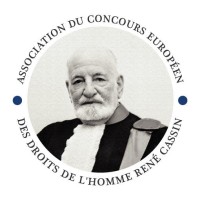
The “Concours européen des droits de l’homme René Cassin” is the oldest advocacy competition in French language in European human rights law. The competition, that brings together University teams from a range of European countries, consists of mock legal proceedings based on the European Convention on Human Rights (ECHR).
Each team is tasked with representing either the applicant or the defendant State(s) Party/-ies to the ECHR. During the written phase, each participating team is invited to write a brief based on a fictitious case of topical interest proposed by the Scientific Advisory Board made up of academics, lawyers and jurists from the European Court of Human Rights. During the oral rounds, thirty-two qualifying teams present their arguments before a panel composed of judges of the Court, lawyers, academics and representatives of the competition’s partner institutions on the premises of the Council of Europe and the European Court of Human Rights in Strasbourg.
Past performance highlights:
- 2012–2013: Third place overall
- 2013–2014: First place overall
- 2015–2016: Second place overall, Prix d’éloquence for Alexandre Sztulman
- 2023–2024: FDEF students awarded at the Moot Court Award Ceremony
Testimonials:
“Le Concours de plaidoirie René Cassin offre une expérience incomparable, fusionnant le savoir juridique avec l’art oratoire. C’est bien plus qu’une simple compétition, c’est une immersion dans le monde du droit et de la rhétorique. Ce concours nous pousse à repousser nos limites intellectuelles et notre capacité à convaincre. La préparation est intense, mais c’est là que se trouve la magie. On plonge dans des recherches approfondies, on analyse chaque aspect du cas, on peaufine notre plaidoirie jusqu’à ce qu’elle soit irréprochable. Chaque détail compte, du choix des mots à l’expression corporelle, tout est pensé pour persuader et émouvoir. Mais ce n’est pas seulement une question de compétition. Le Concours René Cassin crée des liens exceptionnels entre les étudiants. Finalement, lorsque le verdict tombe, que ce soit la victoire ou la défaite, on ressent surtout un profond sentiment d’accomplissement. Le Concours René Cassin laisse une empreinte indélébile qui ne peut être que bénéfique pour le futur et que tous les étudiants devraient expérimenter.”
– Chiara Napoli (2023–2024)
“Participer à ce concours constitue une opportunité unique et inoubliable. Pouvoir se consacrer pendant plusieurs mois à l’élaboration d’un mémoire et d’une plaidoirie sur un cas concret reflétant des thématiques actuelles avec une équipe dynamique et passionnée est une expérience plus qu’enrichissante. En tant que conseiller juridique, mon rôle consistait surtout en un rôle d’appui pour les plaideurs, les mettre en confiance et les rassurer avant tout. Je ne peux qu’être fier du travail que nous avons accompli et de l’aventure que nous avons vécu. La participation au concours est idéale pour travailler une cohésion d’équipe et développer une méthode de travail minutieuse, à la fois orale et écrite, construire des amitiés et forger des souvenirs uniques.”
– Maxime Rosaz (2023–2024)
“Ce fut un honneur pour moi de représenter l’Université du Luxembourg lors d’un concours aussi prestigieux que celui-ci. Avoir la chance de fouler les marches des grandes institutions du Conseil de l’Europe et d’y porter pour la première fois la robe d’avocat afin de débattre de questions de société des plus fondamentales figure au rang des expériences inestimables que notre faculté nous permet de vivre. Je suis infiniment reconnaissante du soutien qu’ont été pendant ces longs mois de préparation notre coach, M. Théo Antunes, ainsi que mes collègues, Maxime Rosaz et Chiara Napoli. Cette aventure, nous l’avons traversée ensemble sans jamais baisser les bras et toujours avec un sourire complice aux lèvres, ce qui n’a pas de prix dans une épreuve où la concurrence est rude. À tous les étudiants de Bachelor et de Master 1 qui seraient intéressés de participer à un moot court l’année prochaine, je leur recommande chaleureusement, autant pour les compétences juridiques et professionnelles qu’ils y acquerront que pour les souvenirs uniques qu’ils en garderont.”
– Tess Van Nuffel (2023–2024)
“Participer au Cassin a été une expérience riche en émotions. Il m’a permis de découvris une nouvelle facette du travail d’équipe avec tout ce qu’il implique : la rigueur, le compromis mais également l’entraide et la solidarité. Mais il m’a également et surtout permis de solidifier mes connaissances en matière de droits fondamentaux et d’apprendre la créativité dans la résolution d’un cas pratique aussi passionnant que compliqué. Plaider au sein des plus grandes instances européennes de protection des droits de l’homme restera une expérience unique et inoubliable.”
-Charlène Cuartero-Saez (2014–2015)
“C’est l’histoire d’une aventure qui s’est transformée en expérience inoubliable. En septembre, lorsque nous avons décidé de nous lancer, jamais nous n’aurions pensé arriver aussi loin, aussi haut. Cette aventure nous a progressivement transformés, et permis de nous dépasser. C’est une aventure qui nous rappelle pourquoi nous aimons le droit : une matière vivante, dynamique, passionnante, mais aussi un instrument qui doit être manié avec délicatesse et rigueur. De simple aventure, cette expérience est devenue inoubliable quand nous avons eu l’honneur de plaider devant la Grande chambre de la Cour européenne des droits de l’Homme. Une expérience à vivre de toute urgence.”
-Maxime Lassalle (2013–2014)
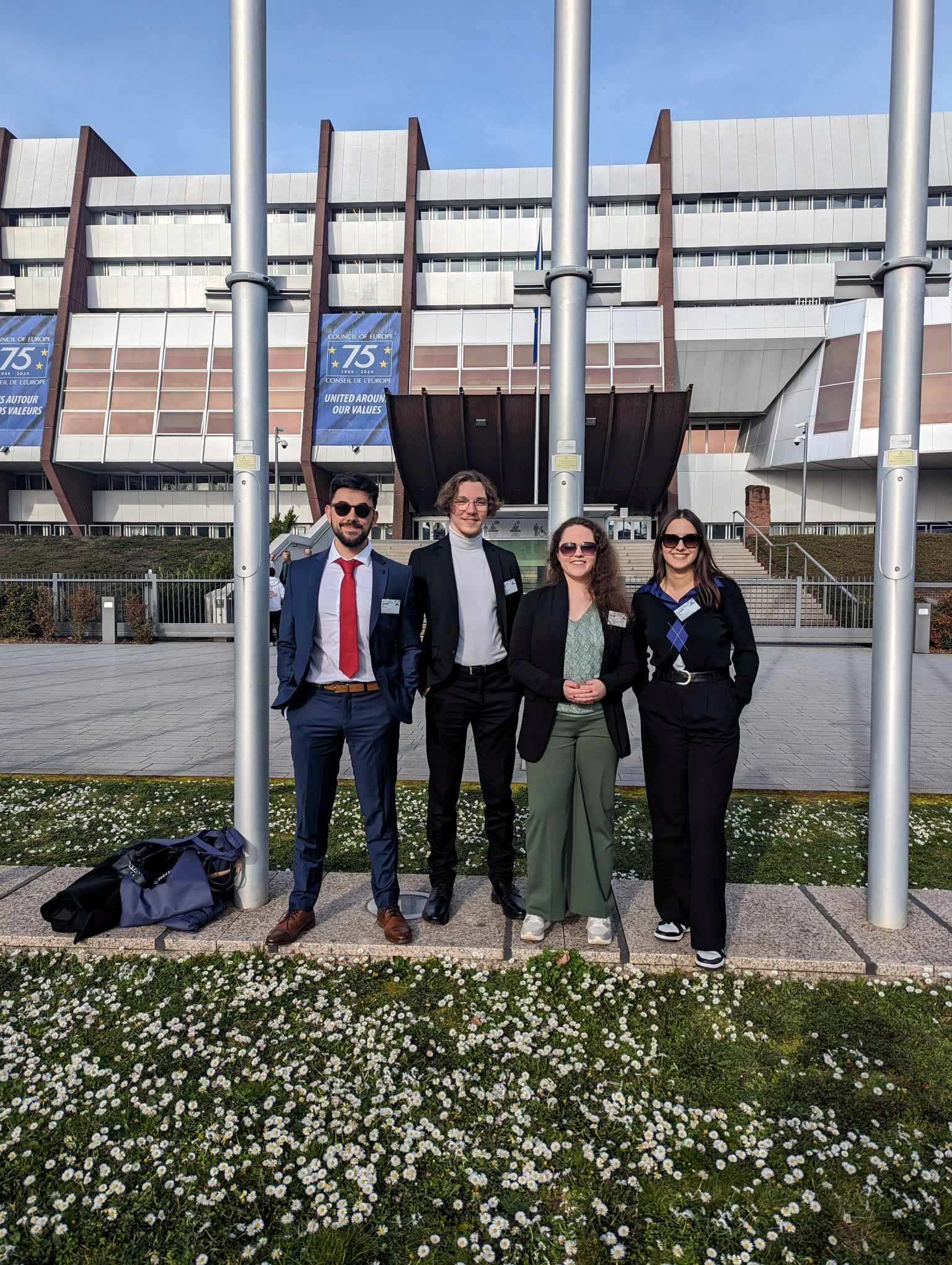
2023–2024 Cassin team
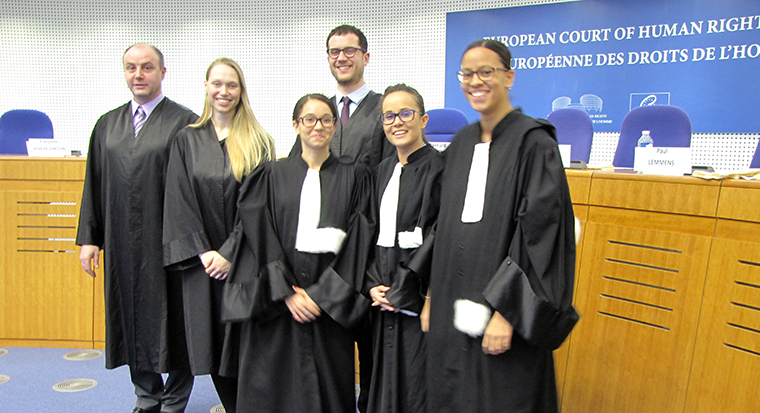
2015–2016 Cassin finalists

The ELMC is a simulated court proceeding in European Union law held in accordance with the rules of procedure of the Court of Justice of the European Union (CJEU). For more than 25 years, the European Law Moot Court Society has organised this prestigious competition. The competition takes place annually in three stages: written submissions on a hypothetical case on current questions of European Union law as well as two stages of oral proceedings. Through all its stages, the competition is bilingual in French and English.
Students set out arguments on behalf of both the applicant and the defendant in the written submissions. The best 48 teams are invited to one of four regional finals. The best four teams compete in the European final, hosted at the CJEU in Luxembourg. In addition, one member from each team participates in an individual competition as the representative of the European Commission or as the Advocate General of the CJEU. Special awards are also given for best speaker and best written submission.
Past performance highlights:
- 2011–2012: Best Commission Agent
- 2013–2014: Best Written Submission
- 2015–2016: Runner-up in the Commission Agent category at the Final in Luxembourg
- 2019–2020: Top 4 teams in the world
- 2020–2021: Top 4 Commission Agent
- 2022–2023: The Uni.lu European Moot Court team competes at the Regional Final in Spain
- 2023–2024: FDEF students awarded at the Moot Court Award Ceremony
- 2024–2025: Advocate, Compete, Achieve: Highlights from the 2025 Moot Court Award Ceremony
Testimonials:
“The Moot Court experience, and in particular the European Law Moot Court, is unique and unrepeatable in all regards. A student’s academic life is certainly full of challenges and commitment as well as group work experiences, but this has nothing to do with the legacy and added value that one acquires through the Moot Court process.
First of all, the skills one acquires are complementary to those acquired through the academic studies since legal writing and especially oral advocacy are not an integral part of most Master’s programmes. Moreover, the real added value of the moot court is teamwork. Indeed, working in a team is perhaps one of the most delicate and challengeable dynamics not only during the academic studies, but also of any professional experience, as it requires from each individual a sincere curiosity, open-mindedness and the ability to recognize both one’s own limits and the added value that all team members can bring. All these prerequisites are indispensable in the Moot Court experience.
On this basis, the profit that each student can gain from this experience is of immense value both in terms of skills acquired and in terms of personal growth. Indeed, unlike what a student experiences on a daily basis in his or her university life, in the Moot Court it is not the result but the process that counts. It is during the process that we confront each other, that we dialogue, that we motivate each other, that we complete and divide our work according to each other’s skills and that we improve both individually and as a team. That is why, when you finally get in front of the “judges” and the teams from other universities, you do so with the awareness that perfection is unattainable, but also with a great deal of pride in all your commitment. It is therefore not surprising that the bond that is created with the other teammates becomes something truly special as between people who have shared unique moments together.
For all this, and for what is difficult to put into words, I recommend this experience to everyone who is offered this opportunity. The Moot Court and the teammates who will share with you this journey will teach you a lot in terms of skills and will leave you with special and indelible memories, I assure you.”
– Giulia Areddu (2022–2023)
“Quel challenge et quelle aventure !
Un challenge car le ELMC c’est travailler sur des sujets complexes de droit que les étudiants n’ont pas nécessairement vu en cours au préalable. Il a fallu fournir un travail intense afin de comprendre et traiter le cas, selon la perspective des demandeurs ou des défendeurs. Nous avons fait énormément de recherches, lu et relu un nombre incroyable de jurisprudences.
Un challenge aussi car nous avons appris à plaider, non pas en tant qu’étudiants mais en tant avocat(es) ou en tant qu’agent(e) de la Commission. Nous sommes clairement sorties de notre zone de confort en défendant notre appréciation du cas.
Un challenge aussi car le ELMC c’est très peu de temps pour préparer les mémoires écrits, la pression est donc importante, et il faut savoir garder le rythme des cours pendant ce temps.
Mais quelle aventure ! Une aventure qui permet aux étudiants d’apprendre à travailler et à évoluer en équipe, d’apporter un côté pratique aux études, de développer un réseau dans le domaine du droit européen. Les mooters sont coachés par des cabinets d’avocats et de nombreuses rencontres sont prévues, ce qui permet de jeter un œil sur les perspectives professionnelles s’ouvrant après le Master.
La phase orale c’est aussi l’opportunité de visiter une ville européenne et de rencontrer des étudiants venants de différentes universités et d’échanger des idées, des visions sur un cas que nous avons tous travaillé et souffert pendant plusieurs mois 🙂
Une aventure aussi car l’adrénaline d’une plaidoirie (la première !) devant des professeurs et professionnels de plusieurs universités de l’Europe entière, c’est une expérience inoubliable.
Le ELMC c’est du travail acharné mais c’est aussi largement récompensé que l’on soit l’équipe finaliste ou pas.
Best of luck for the next team !”
– Clémence Dupuy (2022–2023)
”It was the ELMC that convinced me to become a lawyer because I had a lot of fun working on our case, looking for precise and difficult arguments, anticipating the arguments of the other ELMC participants, and arguing it in front of legal professionals and participants from other universities. Very soon I realised the benefits that the ELMC had brought me. My advice to students who want to participate is to only sign up if you really want to do it. It is a lot of work, you do not get to choose the topics of the moot court, nor your fellow students. You have to start from the premise that you will have to put in a lot of effort, work hard and, above all, make compromises! And if you put your heart and soul into the ELMC, you will emerge greater from this experience.”
– Julie Leclerq (2020–2021)
“Participer au ELMC était pour moi une bonne expérience, cela m’a appris à travailler en équipe et m’a permis de faire de nouvelles rencontres. En plus des apports sur le plan social, le Moot Court m’a permis de savoir ce que je voulais faire plus tard : devenir avocat. C’est une expérience enrichissante que je recommande.”
– Camille Tulasne (2014–2015)
“When coaches and professors say: “You will learn a lot about European law and about yourself, you are going to grow personally but it will be a challenging, life changing experience” believe all of it. It is the sheer truth. By defending a case, by emulating the practical approach of a lawyer, you will improve your legal writing and rhetorical skills and of course your level of legal terminology in French and English. You will return to your academic studies with an even greater appetite to learn more.”
-Nadejda Bolfosu (2012–2013)
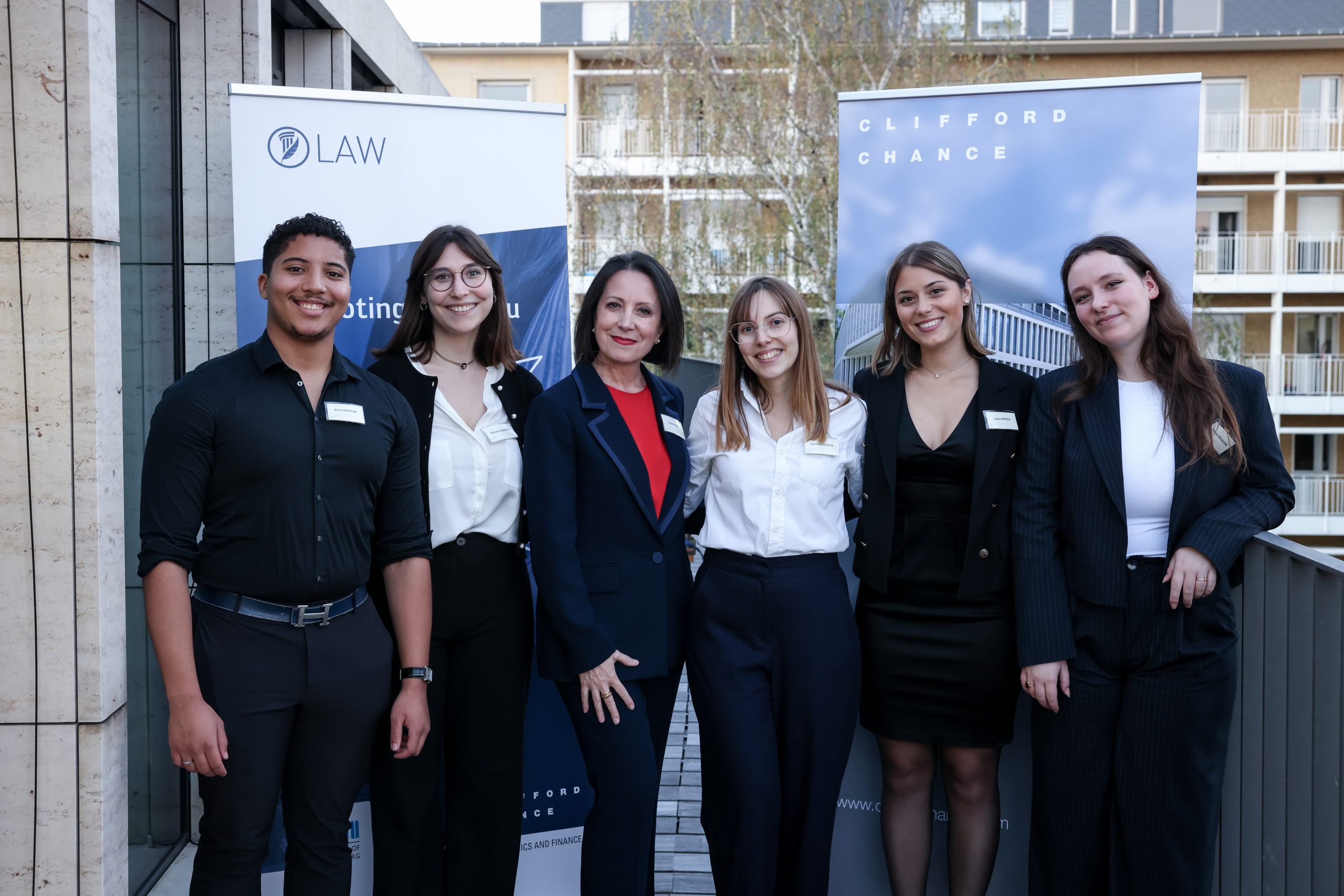
2024–2025 ELMC Team
The ICC Moot Court Competition is an international competition that is organised by the Grotius Centre for International Legal Studies, and it takes place annually in The Hague, the Netherlands. Its aim is both to familiarise the participants with the case law and the proceedings before the International Criminal Court (ICC) and to strengthen their writing and advocacy skills as aspiring international lawyers.
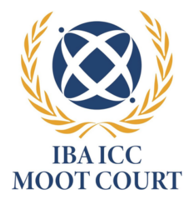
Every participating team has to represent the three different procedural parties: the defence, the prosecution and the victims. The competition consists of two phases: the written and the oral rounds. As soon as the fictional case is published, teams will prepare and send in their memorials, one per procedural party. During the second phase, the “hearings”, teams of three speakers (one for each procedural party) compete against each other. The winner is chosen based on the substance of the arguments and the quality of the performance. Awards are also given for the best memorial, the best victim’s counsel, the best prosecutor and the best non-native English-speaking team.
Student Testimonials:
“Thought-provoking, instructive, and empowering. These are three adjectives that best describe the ICC moot court. Taking part in this competition did not only allow me to acquire deep knowledge in international criminal law, a very sensitive and increasingly important subject. Furthermore, it was the perfect occasion to acquire valuable skills, like conceiving succinct arguments and pleading. On the other hand, participating, like in my case for a second time, in a moot court constitutes a valuable asset for a future legal career. A veritable lifetime experience so unique that it makes one forget its inherent challenges.” – Grazia Bruzzese, Master in European Economic and Financial Criminal Law
“It all started with a simple ‘yes or no’ decision. My answer was obviously ‘yes’ — yes to a challenge, yes to a new working team, yes to sleepless nights, yes to endless meetings, and yes to The Hague. It was a commitment, from the very first informal meeting with our brilliant coach Bruno in September until… well, I don’t think there is a real end. The work may be over, but I will remain a team member of the University of Luxembourg ICC MCC 2025 — be sure of that.
There are two phases: the first, the more technical one, is the Memorial phase; the second, the oral phase. During the first six months, we read the case, built legal arguments through extensive research, produced copies of copies of copies of our memorials, and sent hundreds of versions to Bruno, who somehow managed to correct, modify, and re-write three separate memorials (Prosecution, Common Legal Representative of the Victims, and Defence) simultaneously. Then came the deadline for the written phase. On Sunday morning we met, made the very last amendments, checked, double-checked and triple-checked them to ensure they complied with the Rules and avoided penalty points. It was a nightmare — and yet, I thoroughly enjoyed it.
As soon as the written phase ended, the oral phase began. We needed to select the strongest arguments and be ready to answer questions on any subject — a completely different challenge. Thanks to the Seminars on Oral Advocacy, my role became clearer: I needed to embrece the role of the defence, until I became one: “fake it until you make it”. I dreamt of the defendant, tried to humanise Mr Vragar as much as possible, so that I could defend him and fight for him. It was a two-against-one fight.
Then came the competition: ten intense days during which I often lost track of time. Round after round, I took notes, pleaded, co-counselled, briefed while walking back to the hotel, worked again on questions, answers, pleadings — always thinking about what could have been done better. As defence counsel, I had to adapt my pleading to each round, which was highly stressful, as I depended entirely on the Prosecution and the Victims’ counsel. I had to anticipate their arguments and be ready to counter them. My advantage was that I always had the final word.
It was hard, but it was incredibly worth it. Someone very wise told me that once you have tasted a moot court competition, you will want to go back and do it again. That person was right.
To Melissa, Vadim and Bruno, who always found the right words before pleading: I love you, and I will never forget these nine months. BUT — let’s not forget the damage you caused by defaming my client’s name and his company’s reputation, prosecuting him without proper evidence and relying on hearsay.” – Chloé Antunes (2024–2025)
“Participating in the moot court competition has been one of the most challenging yet rewarding experiences of my life.
These past months have been intense: countless hours of preparation, weekends devoted to research, and many sacrifices to balance classes, exams, and my internship. Arriving in The Hague changed everything. It made me realise just how resilient, talented, organised, and disciplined I truly am. Standing up to plead, I discovered how much I enjoy it — I even found myself having fun. The depth of knowledge our team demonstrated compared with others made me feel incredibly proud.
The ultimate reward came when we were ranked among the top 27 teams worldwide. I could not hold back the tears. Winning the award for Best Prosecution Memorial was a personal recognition of all the hard work and sacrifices. I could not be prouder of myself.
It was not always easy — I was pushed well beyond my comfort zone — but looking back, I know it made me better. It was hard, but it was absolutely worth it!” – Mélissa Teixeira da Silva (2024–2025)
“Every mooting experience is an educative journey. My experience with the ICC MCC 2024 was no exception. It was an opportunity not only to grow intellectually but also on a more personal level. From being required to immerse myself in research and expanding my theoretical knowledge of a field of law that I would normally not have had any other good reason to study in detail, to developing my written and oral argumentation skills, I was challenged in every step of a long 9-month process. I would argue that especially my preparation for the oral rounds pushed me to discover my potential as an oralist, proof that oral advocacy is not a talent reserved for inherently extroverted people. Concurrently, learning to work collaboratively and to persevere through stressful times allowed me to build resilience and character. On master level, it is anyone’s last chance to make an attempt at mooting.
You will not only remember it as the highlight of your studies, but it may also be a unique occasion for you to decide if research could potentially evolve into a professional aspiration of yours. I strongly encourage you not to miss out on it.” – Eirini Botza (2023–2024)
Past performance highlights:
- 2015–2016: Competed in the Main Round of oral pleadings in The Hague, the Netherlands
- 2016–2017: Competed in the Main Round of oral pleadings in The Hague, the Netherlands
- 2023–2024: FDEF students awarded at the Moot Court Award Ceremony
- 2024–2025: University of Luxembourg team wins prestigious awards at 2025 ICC Moot Court Competition
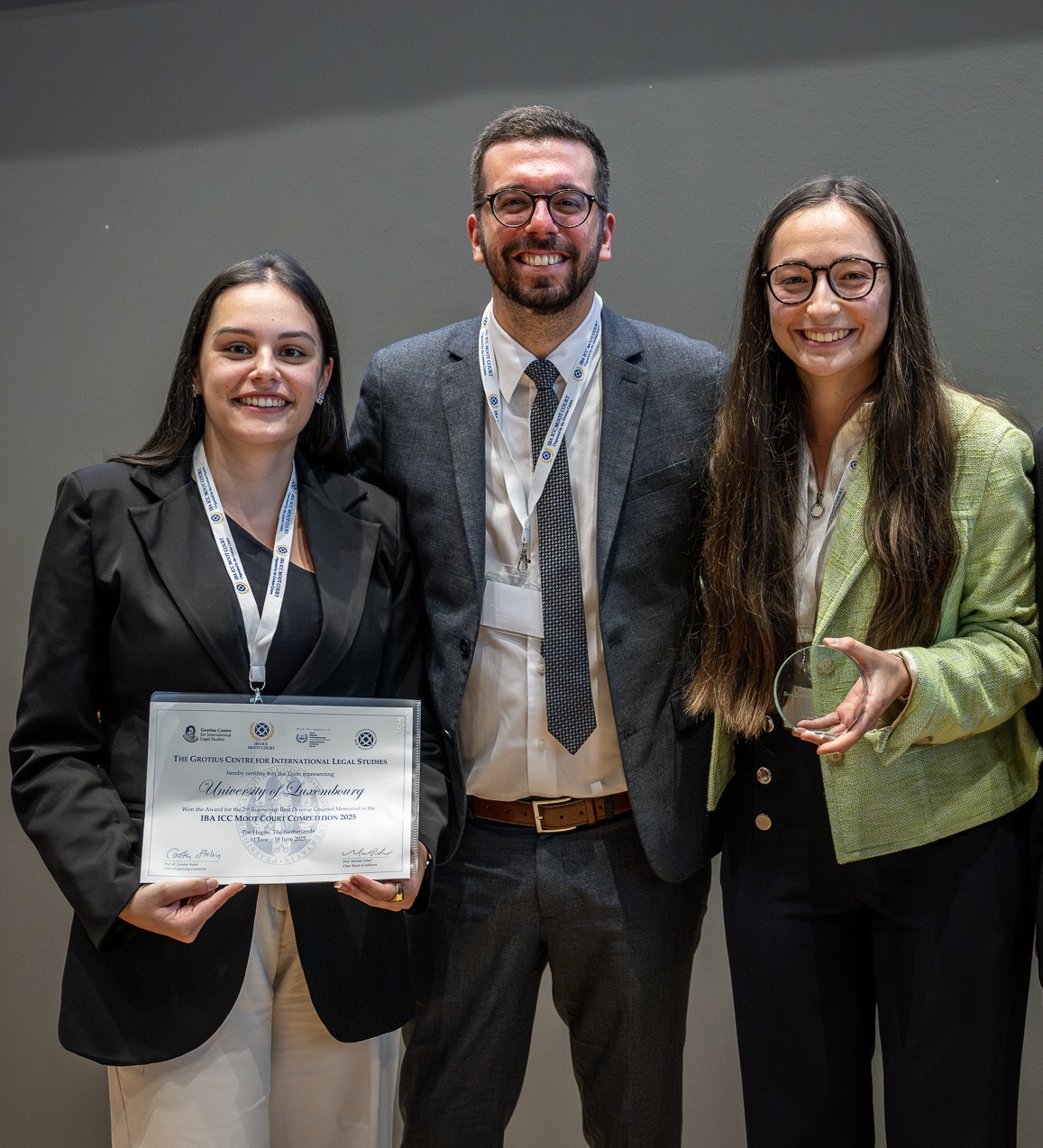
2024–2025 ICC MCC Team Awards
The International and European Tax Moot Court is a simulated hearing before a tax tribunal. The competition consists of a written and an oral stage. Students first submit their memorials with their core arguments for both claimant and respondent with respect to a problem of international and European tax law. The best memorials qualify and are invited to subsequently present their arguments in oral proceedings.
The International and European Tax Moot Court is organised by KU Leuven, Belgium. This moot court is of particular interest for students in the Master in European and International Tax Law.
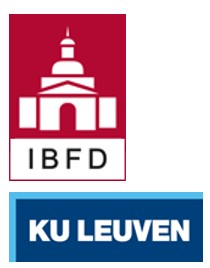
Past performance highlights:
- 2018–2019: Team placed 5th worldwide (best position in the history of the University)
- 2019–2020: Team finished ranking 5th overall and the defendant memoranda was ranked second best overall.
- 2021–2022: Team ranked 5th place overall out of 25 universities, award for the Best Memorandum Applicant, award for the Best Oralist Applicant (received by the student Ahmad Mafaz Syrus)
- 2022–2023: Unilu Tax Law Moot Court team won best Applicant Memorandum Award
- 2023–2024: FDEF students awarded at the Moot Court Award Ceremony
- 2024–2025: Advocate, Compete, Achieve: Highlights from the 2025 Moot Court Award Ceremony
Testimonials:
“Everyone should moot if they can. It is a lot of work, it is stressful, but it is also great, it is a lot of fun, it is incredibly rewarding… You learn just a lot, more than you could ever learn in the classroom. I advise everyone: if you can do it, you should! It is a great skill to have and it makes you better as a person, I think.”
– Ahmad Mafaz Syrus (2021–2022, Best Oralist Applicant)
“The Tax Moot Court experience was invaluable to me. The process of writing a memorandum gave us the opportunity to apply the knowledge that we already had, while also teaching us how to research specific tax doctrine in a practical way. The experience of practicing and pleading in a formal setting was a fun way to improve on everyday skills like speaking with good diction, convincingness and confidence. However, to me the teamwork was the most important aspect of participating in this moot court. Working with my team-members and coach taught me to view things form different angels, to apply patience and listening skills and how to combine everyone’s strengths to come to the best result. I am very thankful that we were given the opportunity to participate.”
– Heleen Klep
“The training and preparatory meetings for this moot court were hard work but, in the end, we saw that it was worth it. The feeling to finally plead our case before the jury was incredible. In a moot court, students have the opportunity to learn a lot – things that you will never learn in the same way in class. We were trained to work in a team, we learned a lot on written and oral pleading skills and of course on the substantive topics of European and international tax law.”
– Julia Hamm (2014–2015)
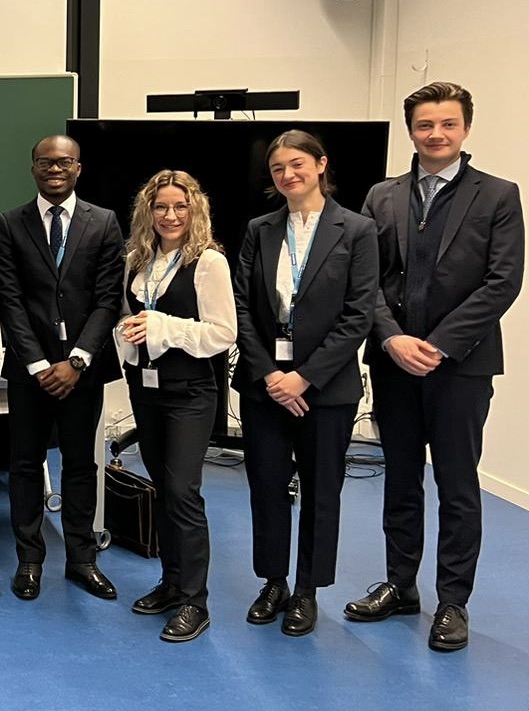
2023–2024 Tax MC team
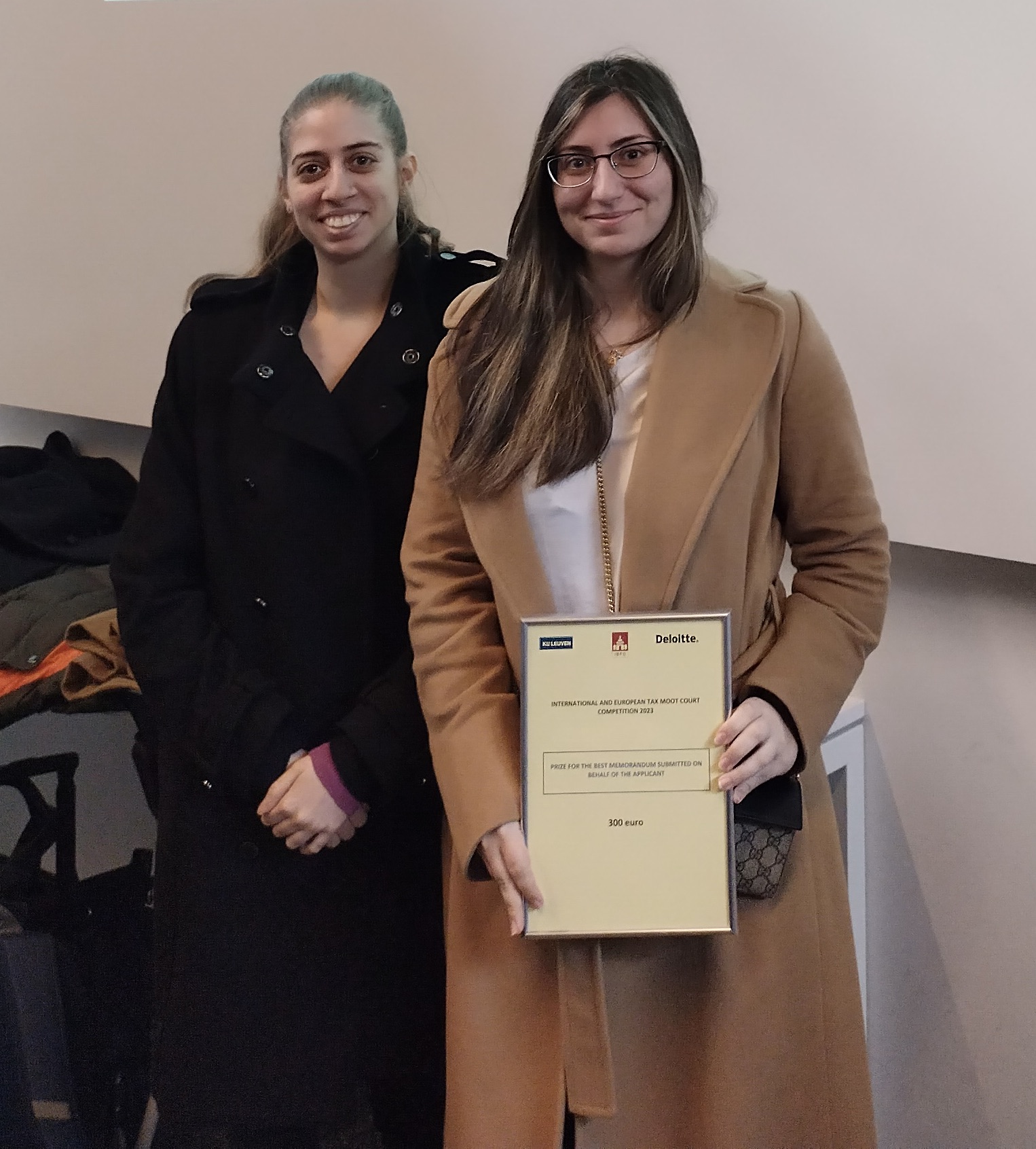
2022–2023 Tax MC Team Award
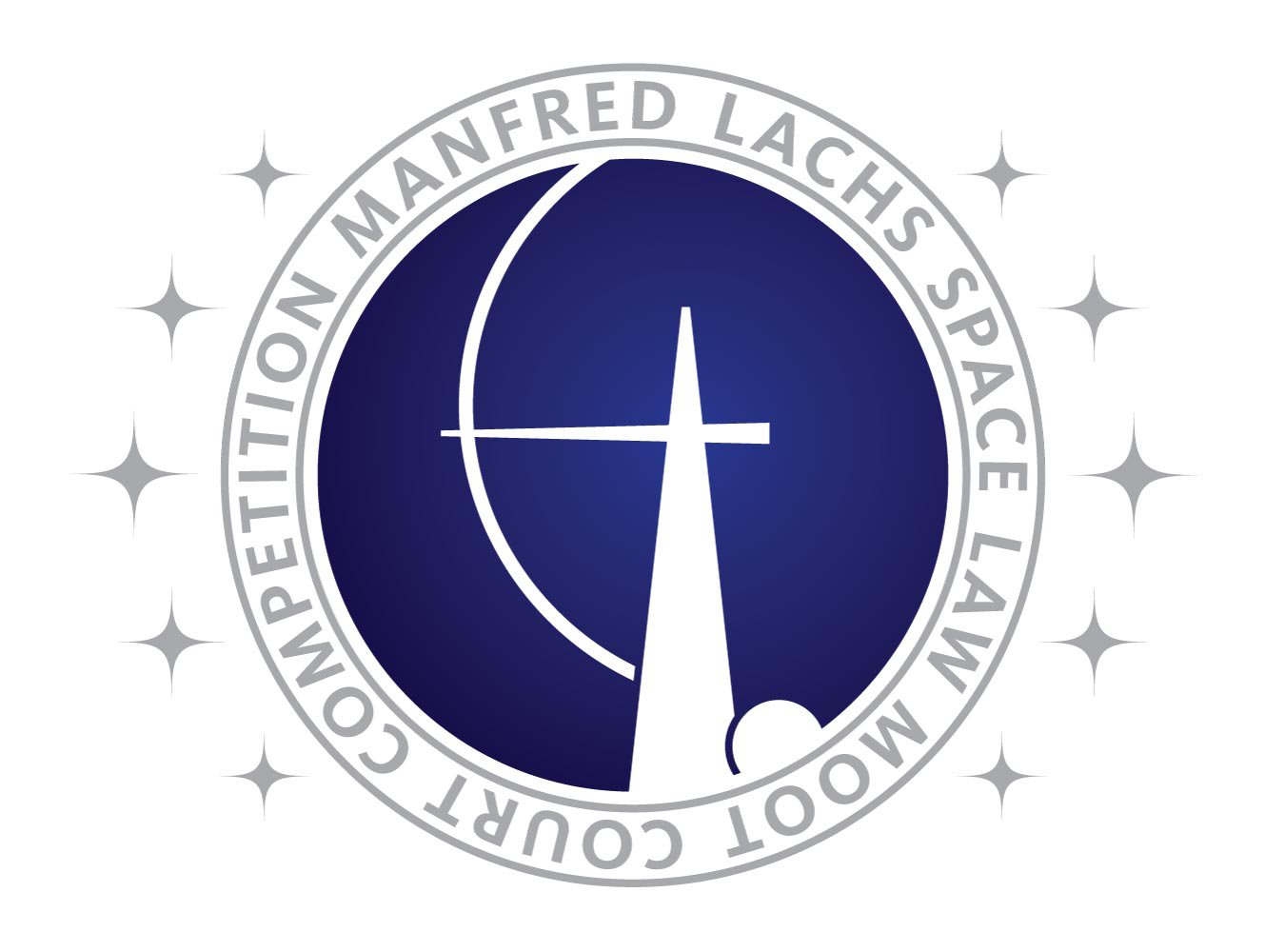
The Manfred Lachs Space Law Moot Court Competition (named after Judge Manfred Lachs, former president of the International Court of Justice) is organised annually by the International Institute of Space Law (IISL). The aim of the Manfred Lachs Space Law Moot Court is to promote the interest in, involvement in and knowledge of space law among students by providing a fair and competitive environment for the exchange of thoughts and the deepening of understanding of space law.
During the first phase, the competition has regional rounds in Asia Pacific, Europe, North America and Africa. Regional winners then compete in the world finals, held in conjunction with the annual International Astronautical Congress. The European Rounds are organised by the European Centre for Space Law (ECSL), together with the IISL. The World Final has the distinction of being judged by three sitting judges of the International Court of Justice. This moot is of particular interest to students in the Master in Space, Communication and Media Law.
The Manfred Lachs team is supported by Planetary Resources.
Past performance highlights:
- 2015–2016: Competed in European regional finals in Glasgow
- 2016–2017: Competed in European regional finals in Helsinki
- 2022–2023: Competed in European regional finals in Spain
- 2024–2025: Advocate, Compete, Achieve: Highlights from the 2025 Moot Court Award Ceremony
Testimonials:
“The most important thing that I have learnt from participating in the Manfred Lachs is that it is important not only to understand the areas of law you are dealing with, but also to allow yourself the freedom to think outside the box, the freedom to flow into unchartered territory and the freedom to be bold, fearless and courageous. Participating in a moot court has to be one of my best experiences at the University of Luxembourg. It is not only an opportunity to network but the opportunity to understand how to be the best lawyer you are striving to be.”
– Dilan Kaplan (2017–2018)
“When I decided to participate in the Manfred Lachs Moot court, I thought that it could be a good learning experience. However, I had no idea how gainful and enjoyable this competition would really be. The moot court was a challenging experience that enhanced my research, writing and presentation skills as well as my knowledge in public international law and international space law. It boosted my confidence to speak in public and offered me a great opportunity to meet and interact with highly recognized lawyers and professors as well as network with law students from all over Europe sharing the same interest in space law.”
– Amélie Werbrouck (2015–2016)
“The 2016 Manfred Lachs Space Law Moot Court Competition focused on topics that are becoming increasingly relevant in this area. It enabled me to enhance my legal writing, research, analysis and advocacy skills. Not only that, but I was also able to develop good communication and team-working skills. Not only did we dedicate much of our time and energy to writing our memorials and practicing our speeches, but also our coaches were always there to help us whenever we needed them. Throughout the whole competition I often asked myself what I had let myself in for. Nevertheless, I do not regret my decision to take part in this competition, since it was a really enriching experience for me.”
– Cédric Roilgen (2015–2016)
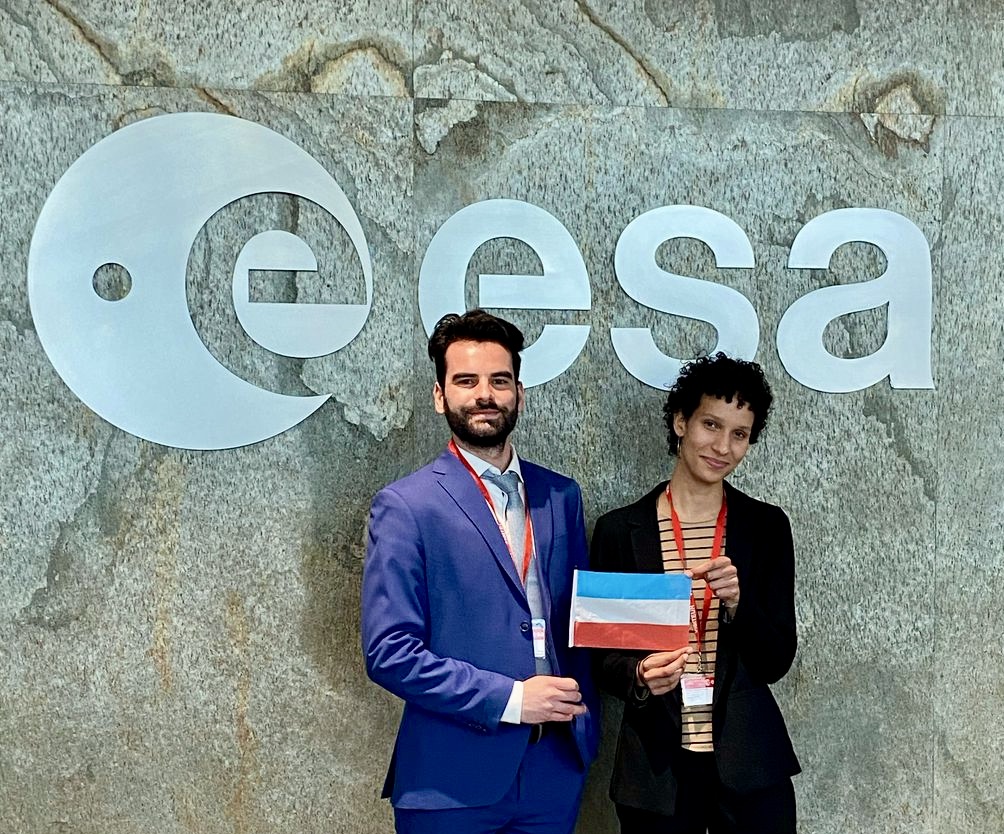
2024–2025 MLMC Team
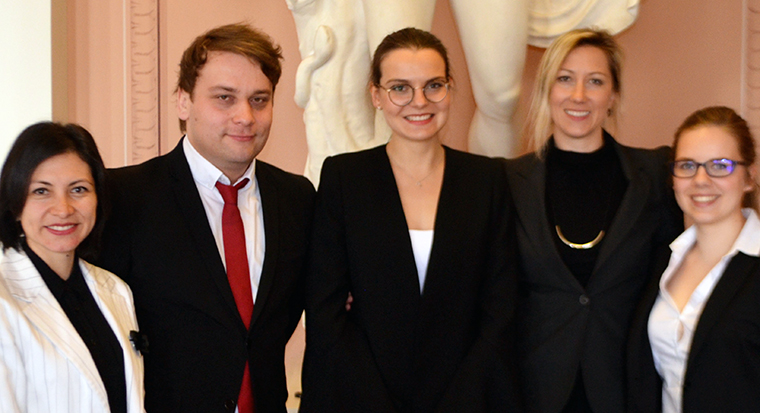
2016–2017 MLMC Team
The Price Media Law Moot Court Competition is part of the Bonavero Institute of Human Rights in the Faculty of Law at the University of Oxford, Hence, the International Round is held every year at Oxford University.
The Price Media Law Moot Court Competition aims to foster and cultivate interest in freedom of expression issues and the role of media and information technologies in societies around the world. Particularly, it engages students in comparative legal research about standards at the national, regional and international levels on these issues. Moreover, it develops students’ ability to argue (in written and oral forms) about cutting-edge questions in media and ICT law.
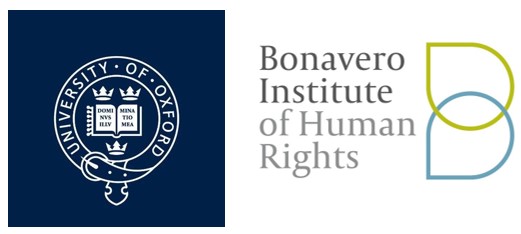
The University of Luxembourg participates every year since 2019 in this competition.
Click here to access the competition website.
Testimonials:
“Intense, enjoyable and rewarding: three words to describe my experience. It was intense in terms of the effort and time that the team needed to put in as well as the range of emotions through which we went through during the preparation phase up to the finale at the oral pleadings. But it was extremely enjoyable for the camaraderie which developed over a short period of time. We could feel a real bond between us in Paris. And rewarding, as it was satisfying to present our work in lawyerly fashion to distinguished panels of moot court judges composed of lawyers, academics and real life judges. It was an incredible experience which I would whole heartedly recommend to any aspiring lawyer.” – Jean René Ludovic Balancy (2023–2024)
“As a mooter in the Monroe E. Price Moot Court, I gained professional confidence and consolidated my knowledge of international law”. – Deborah Tosi, Master in Space, Communication and Media Law.
Past highlights:
To qualify for the International Round in Oxford, teams must qualify in their regional rounds. So far, the University of Luxembourg has always qualified among the top 4 teams at the Northern Europe regional rounds.
- 2019–2020: Luxembourg competed for the first time and took 8th place in this international competition. Best Memorials Runner-up: University of Luxembourg (Northern Europe regional competition).
- 2020–2021: Luxembourg took 10th place in this international competition.
- 2021–2022: The Uni.lu Price team ranked 4th place in the regional Northern European Rounds.
- 2023–2024: FDEF students awarded at the Moot Court Award Ceremony
- 2024–2025: Advocate, Compete, Achieve: Highlights from the 2025 Moot Court Award Ceremony
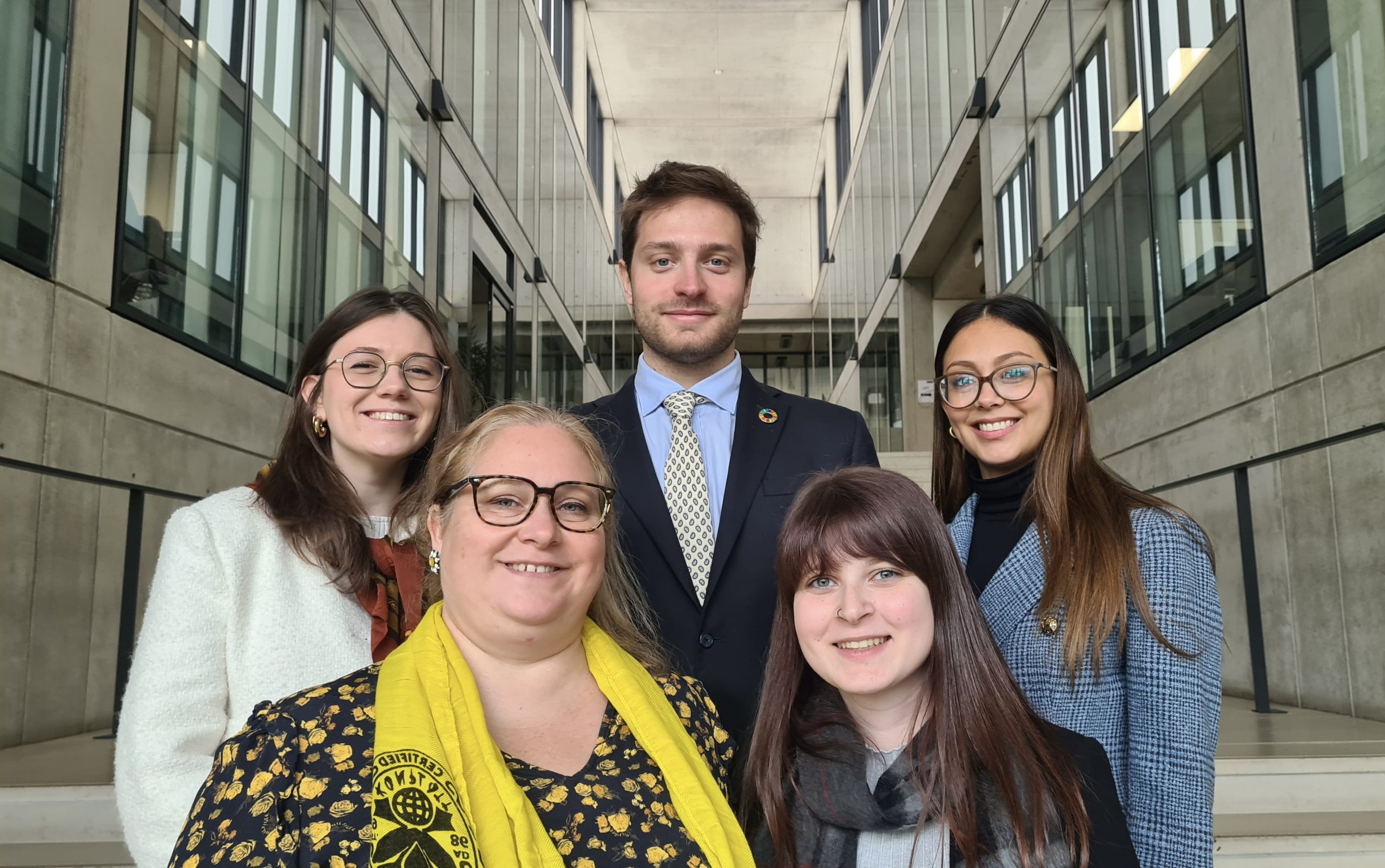
2024–2025 Price MC Team
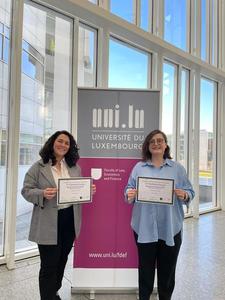
2021–2022 Price MC Team

The Jessup competition is named after Judge Philip C. Jessup, who served on the International Court of Justice (ICJ) from 1961 to 1970. Having been running for over 50 years, it is now the biggest moot court competition in the world, with participants from over 500 law schools in more than 80 countries. Moreover, it enables a community of legal professionals and academics to build bonds and engage in an invaluable cultural and scientific exchange.
The Jessup competition is a simulation of a fictional dispute before the ICJ. It consists of two phases (one written and one oral) and is held in English. Student teams prepare written pleadings on a problem of international law and present their arguments orally, with two teams matched against each other. The International Rounds are hosted in Washington, D.C.
Past performance highlights:
- 2013–2014: 35th place in the International Rounds in Washington D.C.; 24th best pleader overall for Moritz Klein
- 2014–2015: 32nd place in the International Rounds in Washington, D.C., qualification for the Advanced Rounds; Award for the 6th Best Combined Written Memorials
- 2016–2017: 52nd place in the International Rounds in Washington, D.C. out of more than 150 participating teams
- 2022–2023: Students competing at International Rounds in Washington, D.C. against over 130 teams
- 2023–2024: FDEF students awarded at the Moot Court Award Ceremony
- 2024–2025: Advocate, Compete, Achieve: Highlights from the 2025 Moot Court Award Ceremony
Testimonials:
“Participating in the 2024 Jessup Moot Court Competition was certainly tough, tiring, and extremely stressful; but it was overall one of the most rewarding and enriching experiences I have ever had. This is a real opportunity to gain practical legal experience and knowledge of international law; to learn to work as a team and under pressure; and to develop written and advocacy skills which will be useful for any career in law. It also offers the chance to meet and network with talented students from all over the world. Jessup is, finally, a journey of self-development, during which I pushed myself beyond my limits and increased my self-confidence, adaptability and resilience. I think I have learned much more from participating in Jessup than from any course I have taken at university. We are lucky at Uni.lu to have so many opportunities to take part in such competitions, and I would recommend anyone studying law to take part in a moot court.” — Noan Renault (2023–2024)
“Mooting in Uni.lu is one of the most unforgettable experiences I have ever had in my legal studies. Department of Law and our esteemed partner Clifford Chance Luxembourg have provided abundant support from both academic and economic perspectives, making the preparation of the moot courts more robust and sufficient. Also, the highly international environment in Luxembourg has also made the cooperation of team members from diverse social and cultural backgrounds possible. Mooting in an “international” team has taught me many important things out of the mooting itself. I would like to express my most sincere appreciation to all of them who have kindly supported my moot court journey here in Luxembourg. Beyond all of these, it is fun to present your legal analysis of a certain case in front of senior fellows interested in the same field after a long and “painful” preparation. This is yet a worthwhile point to do a moot court – you can communicate with people with the same interests, and engage yourself in a community of like-minded people by participating in a moot court. Most importantly, mooting will let you find your true interest in the career path as a law student. To research, to advocate, to work as a team under pressure, what you have “suffered” are all accurate reflections of your future legal careers. Hope you can enjoy this unique and fascinating journey in Uni.lu. May it please the court, may it please yourself.”
– Zhongyu (Richard) Wang (2022–2023)
“The Philip C. Jessup Moot Court Competition constitutes a unique opportunity to improve a great range of legal skills which are required for a future career in the legal sector. Participants acquire extensive knowledge on efficient research techniques, on drafting highly sophisticated memorials and on obtaining vast legal terminology to express themselves in a refined manner. Furthermore, the six-month preparation to Washington perfectly illustrates the necessity and importance of teamwork, dedication and perfectionism in order to achieve the best possible result. The Jessup Moot, which constitutes the largest moot court competition in the world, is in every aspect a challenge: in order to prevail against 700 law schools only your best performance is good enough.”
-Christoph Rueegg (2014–2015)
“In the beginning, I hesitated as to whether I should do the Jessup or not. Everyone told me it would involve loads of work and time. However, with hindsight, I have to say that it was one of the best experiences during my time as a student. Not only was my knowledge of international law and the ability to plead refined, amazing friendships with the coaches and teammates were built at the same time. It was truly an unforgettable experience, which I have to recommend to every law student, not only for their current studies, but also for their future endeavours.”
-Moritz Klein (2013–2014)
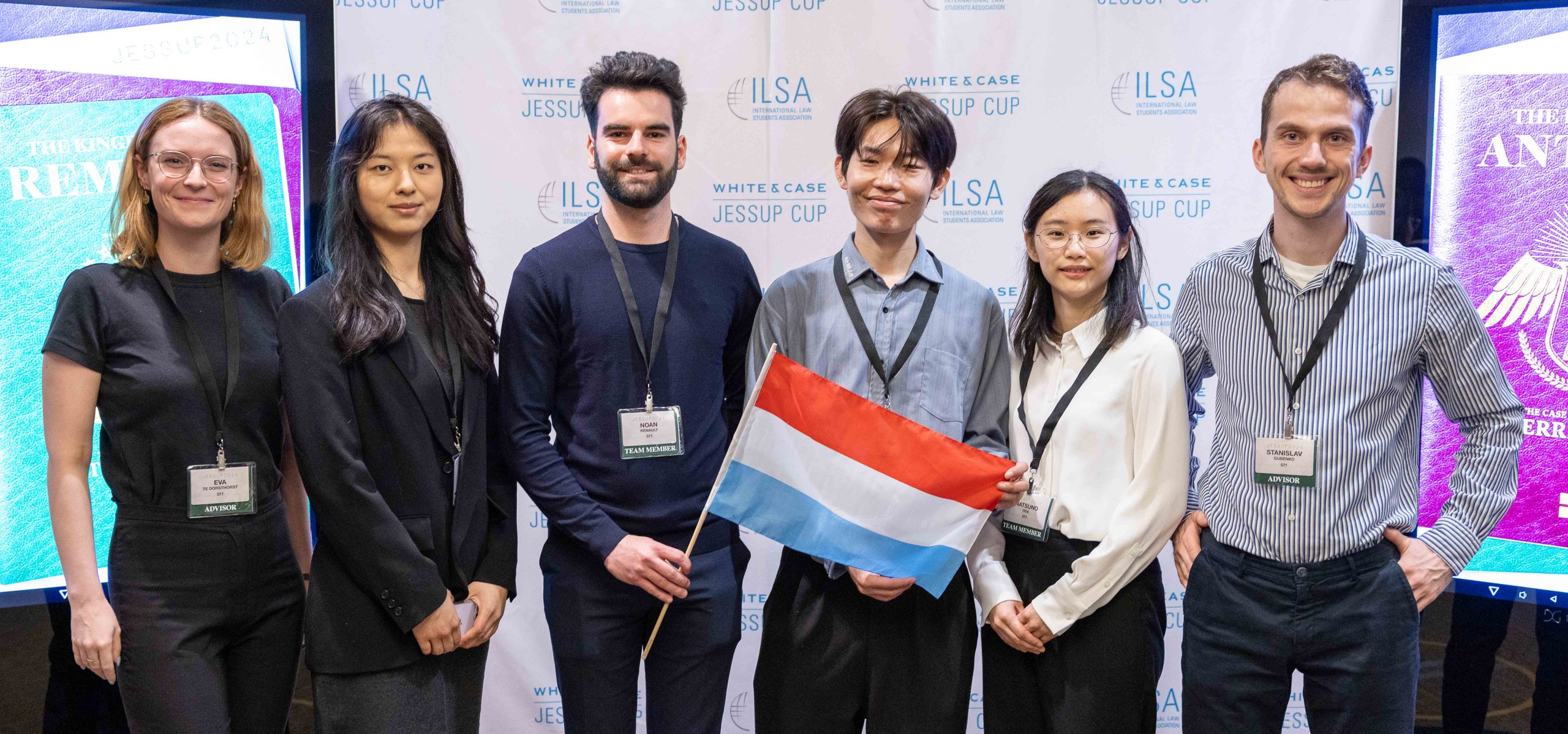
2023–2024 Jessup Team
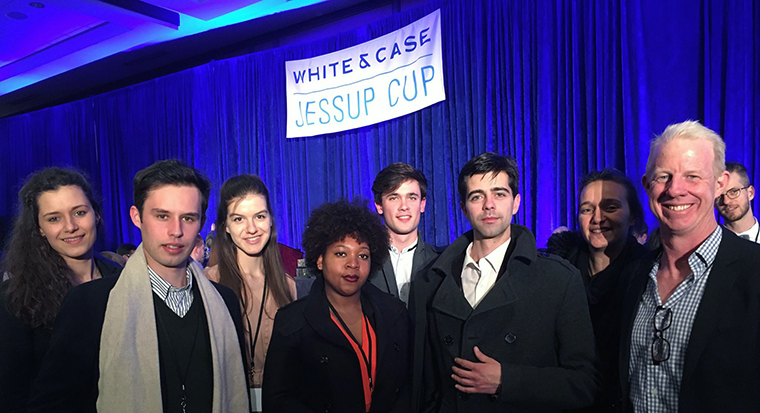
2015–2016 Jessup Team
The FIAMC is a simulated hearing before an arbitration tribunal set up according to the rules of the International Convention for the Settlement of Investment (ICSID). The competition consists of two stages: First, students prepare the core arguments for both claimant and respondent with respect to a topical problem of international investment law. Subsequently, they present their arguments in oral proceedings. Eminent practitioners of international law, including ICJ judges, preside over the final.
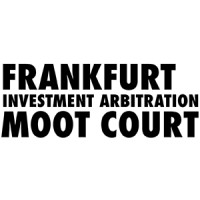
The moot court is hosted at the Johann Wolfgang Goethe University, Frankfurt am Main, with the final taking place at the premises of the Frankfurt am Main Chamber of Commerce and Industry. The final event in Frankfurt is also surrounded by a number of conferences that are often organised in cooperation with arbitral institutions, such as the SCC.
Past performance highlights:
- 2012–2013: Competed in best of sixteen round at the finals in Frankfurt
- 2014–2015: Competed in knock-outs as 8th -best of sixteen at the finals in Frankfurt
- 2016–2017 : Placed 12th overall at the finals in Frankfurt
Testimonials:
Participating in the moot was a great experience, although it included hard work, dedication and little private life. However, if you’re lucky, your team will become your new friends and thus, your new social life. What I particularly liked about the FIAMC was that investment law and cases is probably not something that students normally have on their ordinary curriculum. Hence, participants are able to get introduced to an interesting, sometimes controversial field of law.
– Teresa Quintel (2014–2015)
Signing up for the FIAMC was one of the best academic choices I could have made. It has not only made me develop my teamwork skills, but it has helped me gain confidence in my abilities, be they advocacy skills or working under pressure. Participating in a moot requires a great amount of work and commitment. But is it also one of the most rewarding extracurricular activities a law student can possibly sign up for. I can only give one recommendation to my fellow Master students: participate, be it in the FIAMC or any other moot the University of Luxembourg offers; it is an opportunity you do not want to miss out on!
– Maria Ludwika Grossbusch (2011–2012)
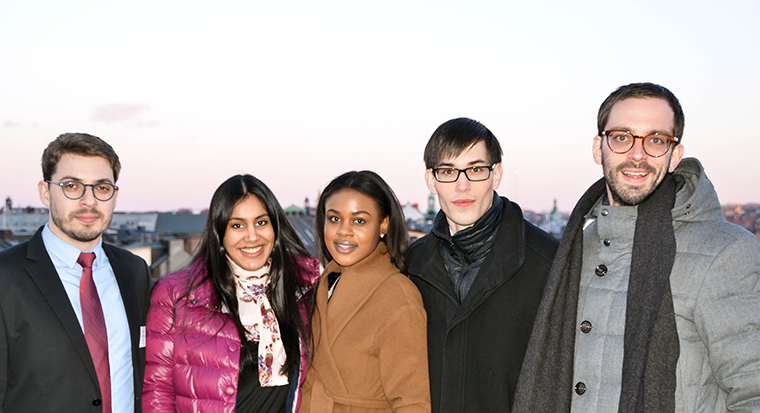
2016–2017 FIAMC Team in Stockholm
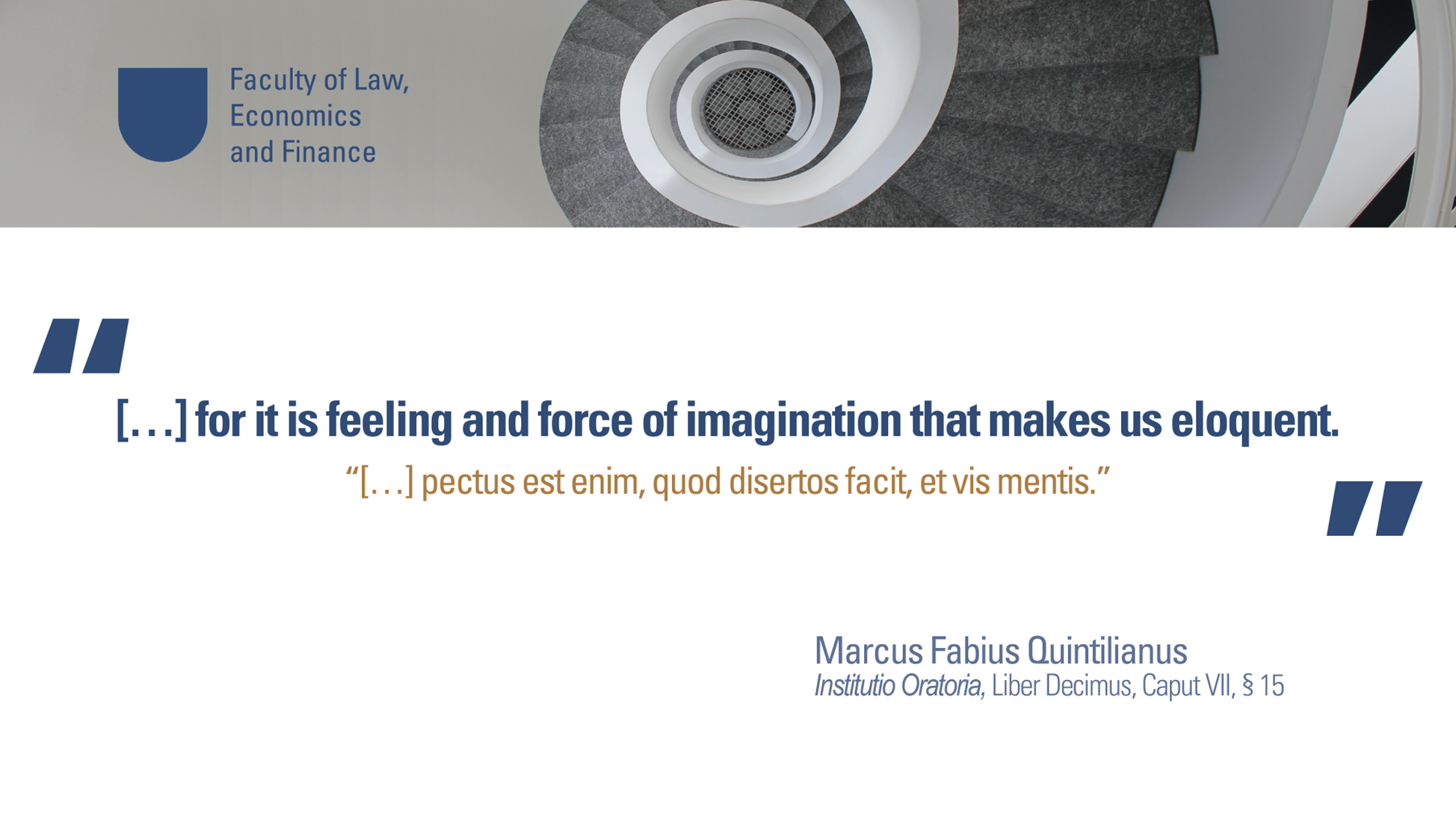
“[…] for it is feeling and force of imagination that makes us eloquent. “[…] pectus est enim, quod disertos facit, et vis mentis.”” – Marcus Fibius Quintilianus, Institutio Oratoria, Liber Decimus, Caput VII, § 15
Join us
If you wish to join the Uni.lu Moot Court Community, please send us an email to moot.courts@uni.lu.
